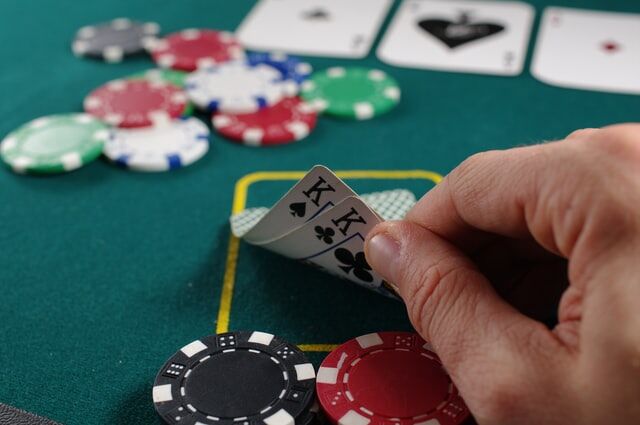
Poker is an exciting game, and if you can get the hang of the basic poker rules and improve your understanding of the game, you'll find it an addictive game to learn. Unfortunately, although poker isn't as complicated as many think it is, many still find it pretty challenging to play the game like a pro.
Learning to master poker can even serve as a means for you to make money. Knowing that there's a possibility of you getting plunged into some massive losses if you're yet to be fully confident about your mastery level, you must learn to balance the fun and excitement that poker brings — this is very important for new players starting. So, whether you are playing poker for fun or as a professional, here are a few strategies to help you ace every game.
Strategy 1: Focus On Ranges, Not Hands
It's easy for someone to tell that you're not dexterous in poker if you're playing and your focus is on your hands. However, how players think about what their opponent has is an easy way to spot average and beginner poker players, regardless of the casino poker.
For instance, advanced poker players often calculate pot odds better by thinking in terms of ranges. Still, on the other hand, beginners only try to put somebody on a specific poker hand. But the question now is, what is a range? In a particular situation, the whole spectrum of poker hands someone can have is a range.
For example, a player can have a complete air-ball bluff, ace-high, a draw, a bottom pair, a middle pair, top pair, or a flush. You'll be able to make the best play when you learn to try and figure out these frequencies, rather than just focusing on identifying a single winning hand like a beginner.
Strategy 2: Ditch Your Favorite Hand
You have a great chance of making bad plays with your favorite hands, so it's often advisable not to give them preferential treatment. However, having some favorite starting hands isn't a terrible thing — many people do. You can read more here to get a better understanding of how poker works. However, it is best to understand that winning poker isn't superstition; it's all about cold complex logic and maths.
Strategy 3: Adopt A Consistent Strategy
Consistently applying a winning strategy is one of the essential poker tips you must be conscious of because it's a great key to becoming a great poker player. However, you may as well choose to be a bit dynamic, especially when you're bored or tilted. Changing things up can be fun at times. No matter what your recent results have been or how you feel, do well to apply the same winning strategy consistently — this is one of the things poker experts do, and it's a great strategy.
Strategy 4: Always Have A Reason
Just as everything has a reason, always have a reason for whatever you want to do. There should be an apparent reason why you are considering breaking from a standard, successful strategy. It's okay if you feel it will be more profitable to deviate from your regular plan; what matters is that you produce a well-reasoned argument for your action.
Strategy 5: Know When To Fold Your Aces
Your ability to know when to fold an overpair is one of the things that will sell you out, whether you're an average poker player or a great poker player. Of course, intermediate players find it challenging to let go because they marry their aces or kings, but good players do not get too emotionally attached to their pretty-looking hands.
Strategy 6: Don't Play Bad Games
Why should you be sitting at a table where someone is playing very poorly? This is a question you should ask yourself. Is it worth it? Being involved in games full of barely good regulars will sabotage your poker results, which isn't good for you if you're still a beginner poker player. Nevertheless, take note that you may not accept this tip too seriously if you're playing poker for pleasure, recreation, or mental challenge.

Bonus Strategy: Realize Tilt Only Hurts You
When you're playing, there's a possibility that you might run lights out or run terribly. Every time you sit down to play card games, be conscious of the fact that there's a possibility that things may go badly, and whenever it does, you have no power nor control over that. Tilt isn't healthy for your poker career, dreams, and bankrolls. And, realize that the only person you are hurting is yourself when you throw your strategy out the window and lose control of your emotions.
Playing poker can be very interesting, but, at times, it may seem frustrating and overwhelming if you're yet to find your feet in the game. However, don't forget that you shouldn't throw away money when the cards go south but maintain more composure by respecting the work that you have done.



(0) comments
We welcome your comments
Log In
Post a comment as Guest
Keep it Clean. Please avoid obscene, vulgar, lewd, racist or sexually-oriented language.
PLEASE TURN OFF YOUR CAPS LOCK.
Don't Threaten. Threats of harming another person will not be tolerated.
Be Truthful. Don't knowingly lie about anyone or anything.
Be Nice. No racism, sexism or any sort of -ism that is degrading to another person.
Be Proactive. Use the 'Report' link on each comment to let us know of abusive posts.
Share with Us. We'd love to hear eyewitness accounts, the history behind an article.